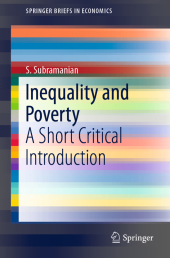 Neuerscheinungen 2019Stand: 2020-02-01 |
Schnellsuche
ISBN/Stichwort/Autor
|
Herderstraße 10
10625 Berlin
Tel.: 030 315 714 16
Fax 030 315 714 14
info@buchspektrum.de |

S. Subramanian
Inequality and Poverty
A Short Critical Introduction
1st ed. 2019. 2019. xv, 96 S. 1 SW-Abb. 235 mm
Verlag/Jahr: SPRINGER, BERLIN; SPRINGER SINGAPORE; SPRINGER 2019
ISBN: 9811381844 (9811381844)
Neue ISBN: 978-9811381843 (9789811381843)
Preis und Lieferzeit: Bitte klicken
This book provides an entry into the subjects of disparity and deprivation, by attending to issues that have a bearing on certain salient philosophical and conceptual aspects of these subjects. The student doing a graduate course in the measurement of inequality and poverty is all too often plunged directly into the complexities of Schur-convex functions, dominance conditions, partial orders and the axiomatics of characterization theorems. Inequality and poverty as phenomena with profound social and moral implications for the world we live in tend to get submerged in a treatment of the subject that is more suggestive of applied mathematics than of the material conditions of life. This is in no way to deny that measurement must deal uncompromisingly with measurement, and therefore with the protocols of formal logic and technical rigour. Having said this, it seems fair to suggest that one´s appreciation of the formalities - as well as of the limitations and ambiguities - of measurement is only aided by a relatively gentle introduction to the subject. This would call for a prior, or accompanying, engagement with the underlying concepts, the philosophical bases, the political salience, the normative values, and the critical facts of the subjects under investigation. It is this necessary background that is emphasized in this book, which is a collection of articles published earlier in the popular press, and intended for consumption by any curious general reader or student with a taste for critical enquiry. The contents of the book will be useful as much for the aspiring scholar as for the interested lay reader looking for a gateway into the subject.
Chapter 1: The Intrinsic Bane of Inequality.- Chapter 2: The Instrumental Harms of Inequality.- Chapter 3: Distributive Justice and Utilitarianism.- Chapter 4: Distributive Justice and Welfare Economics.- Chapter 5: More on Distributive Justice and Welfare Economics.- Chapter 6: On the Conflict between Equity and Efficiency.- Chapter 7: Equality, Efficiency, and ´Levelling Down´.- Chapter 8: Equality and Liberty.- Chapter 9: Inter-Personal versus Inter-Group Inequality.- Chapter 10: The Measurement of Economic Inequality.- Chapter 11: Economic Inequality in India and the World.- Chapter 12: The Language of the Poverty Line.- Chapter 13: The Logic of the Poverty Line.- Chapter 14: India´s Official Poverty Lines.- Chapter 15: Poverty Comparisons across Populations of Different Sizes.- Chapter 16: Targeting Assistance to the Poor.- Chapter 17: Do we have an Obligation to Assist the Distant Needy?.- Chapter 18: Poverty and Inclusive Growth in the Light of the Quintile Income Statistic.- Chapter 19: Deprivation in the Midst of Affluence.- Chapter 20: Growth, Poverty, and Inequality in India: Pulling the Threads Together.
S. Subramanian was a Professor at the Madras Institute of Development Studies, Chennai, India. An economist with research interests in poverty, inequality, demography, welfare economics, collective choice theory and development economics, he has published widely in professional journals, and is the author of (among other books) The Poverty Line (OUP, Delhi, 2012). He is an elected Fellow of the Human Development and Capabilities Association, and was a member of the Advisory Board of the World Bank´s Commission on Global Poverty.


